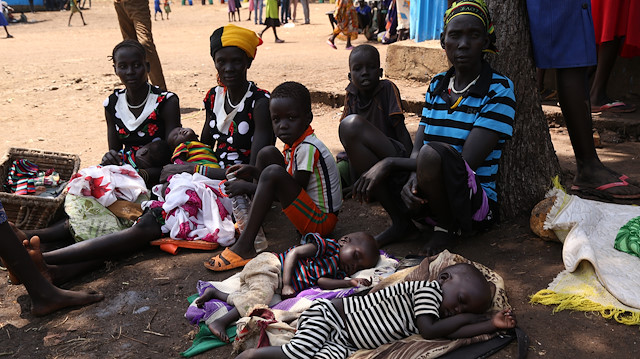
Shortfall in funding affects training programs for refuges in Ethiopia, UN refugee agency says
By looking at him, one cannot imagine the many challenges he faced as he travelled to Ethiopia in 2012, as a refugee fleeing war in the Democratic Republic of Congo (DRC).
"I was only 18 years then, when I and my younger brother set out on a journey to unknown lands," he reminisced about their escape from death and looting that befell their village in Goma.
For more than two decades, the Democratic Republic of the Congo had been in the midst of a humanitarian crisis resulting from recurring armed conflict, natural disasters, and epidemics, according to the UN.
More than 300,000 people have been forced to flee resurgent inter-ethnic violence in northeast Democratic Republic of the Congo (DRC) just this month, the UN refugee agency said.
Anadolu Agency met with Gasominar Mboneza Innocent at a refugee camp, located 28 kilometers (17.4 miles) from Assosa, capital of Benishangul Gumuz regional state in western Ethiopia this week.
He travelled for days through tough terrain in both Uganda and South Sudan before reaching Ethiopia.
Clad in a blue jacket uniform of humanitarian organization, Plan International, Innocent stood under a large tent in Tsome refugee camp.
He is part of those accompanying Equatorial Guinea President, Teodoro Obiang Nguema, who is visiting the camp on an African Union-organized trip for World Refugee Day.
Innocent volunteers with Plan International at the nearby Sherkole refugee camp in the same region.
He says he constantly thinks about his family he left behind in DRC.
"I have no idea about what might have happened to my family in Goma," he said with tears in his eyes.
"I have never had the chance to trace them, let alone communicate with them. I do not know if they are alive or dead," he said, adding, "the thought of what might have happened to them has never left my mind."
Before fleeing Goma, he lived happily with his family, which included a mother, father, brothers, sisters and relatives.
“I used to tend cattle and do household chores. I have never been to school. I have no profession or special skills,” he said.
Even during his years as a refugee in Ethiopia, Innocent has never received formal education or training.
“Life at the refugee camp here for Congolese refugees is very hard. The food we were accustomed to in Congo is quite different from the types of food served at my camp. We also have difficulty adapting to the culture of the host community,” he said.
“I often think about what will happen to us,” he said adding: “We are 500 refugees from DRC living at this camp,”
According to the UNHCR there are 11,017 refugees and asylum seekers from different countries residing at the camp.
The United Nations refugee agency admits that there are limited opportunities to train refugees to become self-reliant and make a living for themselves.
UNHCR says: “Less than 18% of refuges are getting access to livelihood activities including skills training, small business development, and small-scale gardening,”
It seems there is always a gap in UNHCR funding for refugees in Ethiopia.
In Benishangul Gumuz alone, there are six refugee camps namely Bambasi, Kamashi, Tongo, Gure Shombola, Tsore and Sherkole where, according to UNHCR, a total of 63,590 refugees are taking shelter.
According to UNHCR, the funding gaps for 2019, stands at 47% funded against 53% funding gap.
“As of August 31, 2018, Ethiopia is host to 905, 831 refugees, the majority from South Sudan (46.6%), Somalia (28.4%), Eritrea (19.2 %), and Sudan (4.9%),” a UNHCR statement indicates.
All these refugees reside in Ethiopia, a country struggling to provide for its own internal displacement population.
According to UNHCR internally displaced people in Ethiopia to date stand at 3.19 million people but government figures put it at 2.8 million.
Despite having its own challenges, Ethiopia is praised for pursuing an open-door policy for welcoming refugees and granting them rights to access education, employment and other privileges.
UNHCR Assistant High Commissioner George Oloth-Obbo on Tuesday called for improved funding and enhancement of the provision of education to refugee communities.
Meanwhile, the president of Equatorial Guinea pledged to give $50, 000 in support to refugee communities during his visit to Tsome refugee camp in Ethiopia.






